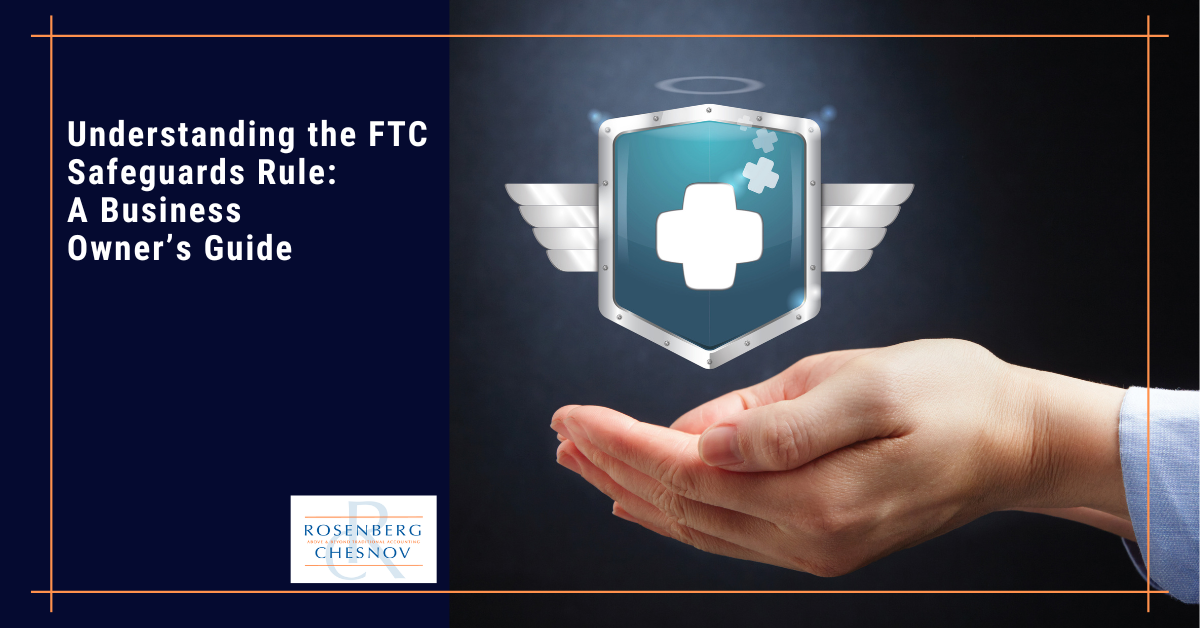

Understanding the FTC Safeguards Rule: A Business Owner’s Guide
Category: Accounting
Being the personal representative of the estate of a deceased person is, to put it mildly, not an easy job.
It involves significant responsibility, many complex tasks, and a considerable investment of time. On top of all that, the individual given this role is often someone who knew and cared about the decedent, such as a family member, close friend, or colleague.
When you’ve lost a loved one, the last thing you may want to do is deal with a lot of stress and obligation. Nevertheless, there are affairs to manage, and ignoring them can lead to serious consequences for the estate.
In this post, we’ll explore the role and responsibilities of a personal representative of an estate, as well as key tax considerations to keep in mind.
To discover more, keep reading below.


An executor and a personal representative are both individuals who play central roles in managing a deceased person’s affairs — and in fact, the two terms are often used interchangeably in practice.
However, the exact meaning of each term, which can vary by legal jurisdiction, differs somewhat in ways related to the individual’s appointment, responsibilities, and role in administering the estate.
Generally, an executor is someone named by the deceased in their will who derives their authority from the will itself. Meanwhile, “personal representative” is a broader term in some jurisdictions, encompassing various roles and responsibilities.
A personal representative can also be an executor if the deceased person left a valid will appointing someone to that role. In this case, the executor is also the personal representative.
However, if the deceased person did not have a will or if the will did not name an executor, the court may appoint someone to manage the estate, and this court-appointed individual is often called the personal representative. In this context, the personal representative functions similarly to an executor but may not have the same level of authority or discretion.
The roles and responsibilities are generally similar, but the specific legal context and authority may differ depending on the circumstances, local laws, and the terms of the will, if applicable.
Again, this may vary based on the laws and regulations of the jurisdiction.
Typically, however, the personal representative must be an adult (usually 18 or older) and mentally competent to carry out the duties and responsibilities associated with the role.
Some jurisdictions may require the personal representative to reside in the same state or country where the deceased person did, or where the estate is administered.
Many jurisdictions also disqualify individuals with felony convictions, and courts often prohibit individuals with a significant conflict of interest. For example, someone who is a creditor of the estate or has a competing claim to estate assets may be disqualified. Furthermore, in some cases, a person currently in bankruptcy may not be eligible to serve as a personal representative.
Family members, such as spouses, children, siblings, or parents, are often eligible to serve as personal representatives. However, some jurisdictions may impose restrictions or additional requirements for certain family relationships.
For what tasks is the personal representative of an estate responsible?
The personal representative of an estate is responsible for a wide range of tasks related to administrating the deceased person’s estate. These may include:
It’s important to note again that the specific responsibilities of a personal representative can vary depending on the complexity of the estate, the terms of the will, and the laws of the jurisdiction in which the estate is being administered.
Additionally, serving as a personal representative can be time-consuming and involve complex legal and financial tasks, therefore, the individual must be willing to accept the role’s responsibilities.
Given the challenges involved, personal representatives often seek legal and financial advice to ensure they fulfill their duties correctly and in accordance with the law.
Once again, there is no one-size-fits-all answer. The time it takes to settle an estate can depend on the complexity of the estate, local laws, the presence of disputes or litigation, and the efficiency of the personal representative, among other factors.
Timing can be especially variable if the estate must go through the probate process. In some jurisdictions, probate can be relatively straightforward and quick; in others, it may take several months or even years, particularly if there are complications or disputes.
Additionally, most jurisdictions require the personal representative or executor to notify creditors of the estate’s administration, which can also extend the settlement timeline as creditors typically have a specified period to file claims against the estate.
Furthermore, state or provincial laws may impose specific time limits or requirements for certain actions in the estate settlement process — personal representatives should be aware of these legal requirements.
Lastly, preparing and filing income and estate tax returns can also impact the timeline. Tax obligations must be addressed before the estate can be fully settled.
Here are some key considerations of which to be aware:
Given the complexity of estate tax laws and the potential tax liabilities associated with estate administration, personal representatives should work closely with tax professionals or estate attorneys to ensure compliance with all tax obligations.
To learn more about how to file a final tax return for a deceased person (and what happens if you don’t!), look at our previous blog post on the subject.
Seeking professional advice and staying informed about tax laws is vital to effectively fulfilling a personal representative’s duties while minimizing tax liabilities for the estate and beneficiaries — not to mention for the representative themselves!
If you are a client and would like to book a consultation, call us at +1 (212) 382-3939 or contact us here to set up a time.
If you aren’t a client, why not? We can take care of your accounting, bookkeeping, tax, and CFO needs so that you don’t have to worry about any of them. Interested? Contact us here to set up a no-obligation consultation.
Interested in receiving updates in your mailbox? Check out our newsletter, full of information you can use. It comes out once every two weeks, and you can register for it below.


Category: Accounting


Category: Management


Category: Management
Send us a message and we will contact you as soon as possible.
Send us a message and we will contact you as soon as possible.
Jeff Coyle, CPA, Partner of Rosenberg Chesnov, has been with the firm since 2015. He joined the firm after 20 years of business and accounting experience where he learned the value of accurate reporting, using financial information as a basis for good business decisions and the importance of accounting for management.
He is a diligent financial professional, able to manage the details and turn them into relevant business leading information. He has a strong financial background in construction, technology, consulting services and risk management. He also knows what it takes to create organizations having built teams, grown companies and designed processes for financial analysis and reporting.
His business experience includes:
Creating and preparing financial reporting, budgeting and forecasting.
Planning and preparation of GAAP and other basis financial statements.
Providing insight on financial results and providing advice based on those results.
Jeff also has a long history of helping individuals manage their taxes and plan their finances including:
Income tax planning and strategy.
Filing quarterly and annual taxes.
Audit support.
General financial and planning advice.
Prior to joining the firm in 2015, Jeff was in the private sector where he held senior financial and management positions including Controller and Chief Financial Officer. He has experience across industries, including construction, technology and professional services which gives him a deep understanding of business.
Jeff graduated from Montclair State University, he is a CPA and member of the American Institute of Certified Public Accountants, New York State Society of Certified Public Accountants and New Jersey State Society of Public Accountants.
Jody H. Chesnov, CPA, Managing Partner of Rosenberg Chesnov, has been with the firm since 2004. After a career of public accounting and general management, Jody knows the value of good financials. Clarity, decision making, and strategy all start with the facts – Jody has been revealing the facts and turning them into good business results for more than three decades.
He takes a pragmatic approach to accounting, finance and business. His work has supported many companies on their path to growth, including helping them find investors, manage scaling and overcome hurdles. His experience and passion for business reach beyond accounting and he helps businesses focus on what the numbers mean organizationally, operationally and financially.
He has a particular expertise in early-stage growth companies. His strengths lie in cutting through the noise to come up with useful, out of the box, solutions that support clients in building their businesses and realizing their larger visions.
Prior to joining the firm in 2004, Jody was in the private sector where he held senior financial and management positions including General Manager, Chief Financial Officer and Controller. He has experience across industries, which gives him a deep understanding of business.
Jody graduated with a BBA in Accounting from Baruch College, he is a CPA and member of the American Institute of Certified Public Accountants and New York State Society of Certified Public Accountants.
In addition to delivering above and beyond accounting results, Jody is a member of the NYSCPA’s Emerging Tech Entrepreneurial Committee (ETEC), Private Equity and Venture Capital Committee and Family Office Committee.
He is an angel investor through the Westchester Angels, and has served as an advisor for many startup companies and as a mentor through the Founders Institute.